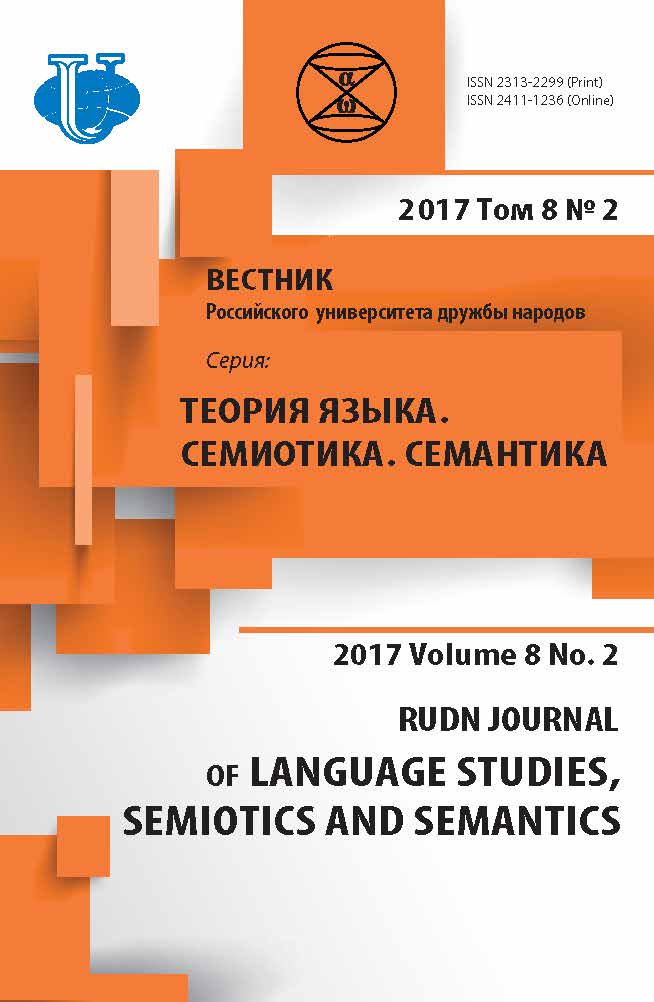The Representation of Universal Moralvalue “Freedom” in Linguistic Consciousness of Russian Culture Bearers
- Authors: Zhamaletdinova EK.1
-
Affiliations:
- The institute of Linguistics of the Academy of Sciences of Russia
- Issue: Vol 8, No 2 (2017)
- Pages: 384-393
- Section: ARTICLES
- URL: https://journals.rudn.ru/semiotics-semantics/article/view/16348
- DOI: https://doi.org/10.22363/2313-2299-2017-8-2-384-393
- ID: 16348
Cite item
Full Text
Abstract
This paper examines the meaning of universal moral value “freedom” reflected in linguistic consciousness of Russian culture-bearers. It contains the results of the analysis of the way the value is represented on official and common levels of consciousness. Within the framework of the research on the official level of consciousness the data of encyclopedic dictionaries is analysed. That aims to reflect the scientific worldview of Russian culture-bearers. Their everyday worldview is revealed through the analysis of the data of lexicographical literature, Russian text corpus, paroemiological fund as well as the results of associative and psycho-semantic experiments. The methodology of the research is based on the theory of activity approach elaborated by Moscow psycholinguistic School and the triangulation approach designed by V.A. Yanchuk. The latter approach allows to integrate knowledge of different layers and the methodology aiming at obtaining the most precise findings. The results of the given research shows the variety of meanings of the value “freedom” used on the common level of consciousness. That indicates the practical attitude to the value considered in the perception of the Russians. The methods of the analysis has a great potential for further research of different notions.
About the authors
E Kh Zhamaletdinova
The institute of Linguistics of the Academy of Sciences of Russia
Author for correspondence.
Email: khamitovich@gmail.com
B. Kislovsky per., 1, bldg 1, Moscow, Russia, 125009
References
- Andreeva, I.V. (2007). The Concepts of Freedom, Fairness, Law, Motherland in the World view of the Russians and Americans. Issues of Culturology, 4, 11—14. (in Russ).
- Arutyunova, N.D. (2003). Will and Freedom. Logic Analysis of Language In: Space and chaos: conceptual fields of order and disorder. Moscow: Indrik. p. 73—99. (In Russ).
- Berdjaev, N.A. The Philosophy of Freedom. The Sense of Creative Work. URL: http://predanie.ru/ berdyaev-nikolay-aleksandrovich/book/69721-filosofiya-svobody (accessed: 12.11.2016). (in Russ).
- Vezhbitskaya, А. (1999). Semantic Universals and Description of Languages. Moscow: LRC Publishing House. (in Russ).
- Gudkov, L.D., Dubin, B.V. & Zorkaja, N.A. (2011). The Youth of Russia. Moscow: Moscow School of Political Studies. (in Russ).
- Gudkov, L.D., Dubin, B.V. & Zorkaja, N.A. (2011). Post Soviet Man and Civil Society. Moscow: The Moscow School. (in Russ).
- The Constitution of the Russian Federation. (1993). URL: http://www.constitution.ru/ (accessed: 12.11.2016).
- Gritsanov, A.A. (Ed.). (2003). The Newest Philosophical Dictionary. Minsk: Knizhnyi Dom. (in Russ).
- Russian National Corpus. URL: http://ruscorpora.ru/ (accessed: 16.01.2017).
- Rozanov, V.V. (2001). Fallen leaves. A second box and the last one. Moscow. (in Russ).
- Sulakshin, S.S. & Bagdasaryan, V.E. (2013). Supreme Values of the Russian State. Moscow. (in Russ).
Supplementary files












